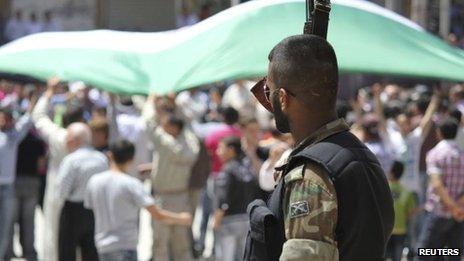Syrian rebel commanders split on ceasefire deadline
- Published

A commander in the rebel Free Syrian Army (FSA) has given the government of President Bashar al-Assad a 48-hour deadline to observe a UN ceasefire.
The FSA's Colonel Qassim Saadeddine in Homs said if there was no response by Friday lunchtime the FSA would consider itself "no longer bound" by the plan.
But the FSA head, General Riyad Asaad, later denied the deadline existed.
Instead, he urged peace envoy Kofi Annan to issue a statement declaring the peace plan to have failed.
The BBC's Paul Wood, who has just returned from three weeks inside Syria, says there is no ceasefire holding on the ground.
In the latest of a string of bloody incidents, UN observers have confirmed the discovery of 13 shooting victims near the city of Deir el-Zour.
The find came only days after the massacre of more than 100 people - many of them children - in the town of Houla.
Col Saadeddine's ultimatum, citing the Houla massacre, was given in a video released online, in which he said the government had to "implement an immediate ceasefire, withdraw its troops, tanks and artillery from Syrian cities and villages".
"It should also allow immediate humanitarian aid to all affected areas and free all detainees... The regime should also enter into a real and serious negotiation through the United Nations to hand over power to the Syrian people," he went on.
But Colonel Asaad, speaking to al-Jazeera by phone from the Turkish border, insisted the FSA was "committed to the Kofi Annan plan and committed to international resolutions and implementing this plan".
"There is no deadline; however, we hope that Kofi Annan will issue a statement to announce the failure of this plan," he said.
All of the demands of Col Saadeddine are provisions of the peace plan put forward by UN-Arab League special envoy Kofi Annan, the BBC's Jim Muir reports from neighbouring Lebanon.
The FSA is poorly armed and no match for the heavy weapons and tanks of the regime forces, our correspondent says.
But the UN has confirmed that the FSA continues to control significant parts of many towns and cities, as well as much of the countryside in some areas, he adds.
UN Secretary General Ban Ki-moon has again urged Syria to implement the ceasefire.
"The UN did not deploy in Syria just to bear witness to the slaughter of innocents," he said in Istanbul. "We are not there to play the role of passive observer to unspeakable atrocities."
The US ambassador to the UN, Susan Rice, said earlier that further escalation of the conflict was the likeliest scenario now, with it also spreading to other countries in the region.
"Members of this council and members of the international community are left with the option only of having to consider whether they're prepared to take actions outside of the Annan plan and the authority of this council," Ms Rice said, after a closed meeting of the UN Security Council.
Hopes of a new initiative over Syria at the council have been dented by Russia and China.
Russian Deputy Foreign Minister Gennady Gatilov said Moscow was "categorically against any outside interference".
And a spokesman for China's foreign ministry reiterated Beijing's opposition to military intervention in Syria or forced "regime change".
'Appalling and inexcusable'
The UN confirmed on Wednesday the discovery of 13 men's bodies near the eastern city of Deir al-Zour, with their hands tied behind their backs, some apparently shot in the head.
Footage shows the bodies of men with their hands bound
UN mission chief Maj Gen Robert Mood said he was "deeply disturbed" by the "appalling and inexcusable act".
The UN Human Rights Council will hold a special session on Syria on Friday looking into the killings, officials said.
As many as 15,000 people have been killed since the revolt against the rule of President Bashar al-Assad began in March of last year.